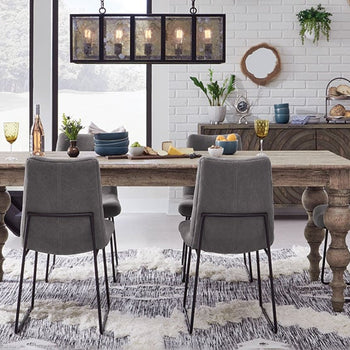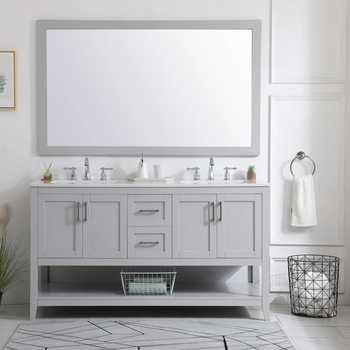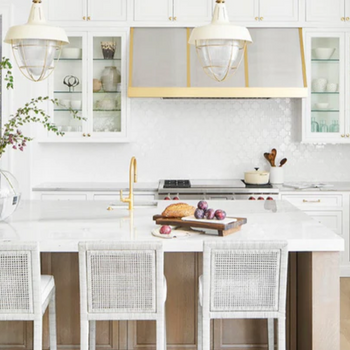Hiring a Contractor: How to Find (& Work with) a Contractor
By Mikael Short
February 11, 2022
Whether you’re doing a remodel or renovation in your home, you may need to hire a contractor to help the job get done well… and right. While some renovations are easy to DIY, others will need a professional contractor to ensure proper installation.
When it comes to finding and hiring a contractor for your home renovation, it can be confusing and overwhelming to know where to start. You may be asking, “What is a contractor? How do they help? How much is that going to cost?” And those questions only scratch the surface of this topic.
Here are our recommendations on how to find a contractor you can count on to bring your home remodel vision to fruition.
What Does a Contractor Do?
When it comes to home remodeling, contractors take care of the labor in making the changes. They oversee and perform the physical work of tearing down walls or other demolition work, bringing in and installing new materials, and cleaning up when the job is finished.
A general contractor coordinates and manages the details for large remodeling projects to make sure it’s done right the first time. They usually manage a team of subcontractors to ensure the project is finished in a timely and efficient manner.
A good general contractor can likely connect you to subcontractors and other tradesmen who can contribute to your remodel.
Types of Contractors & Subcontractors
Different contractors will take care of different aspects of the job, depending on their specialty or niche.
- Professional remodeler — Handy for planning and completing considerable remodels meant to restructure sections of your home.
- Subcontractor or tradesman — Niche trades that require training, experience, or licenses.
- Carpenter — Constructs and installs features to bring your remodel to life.
- Handyman — Skilled at a wide range of jobs that can be done around the home.
- Interior Designer — Creates the look and design of your space and assures that it is functional and beautiful.
- Landscaper — Builds and maintains outdoor areas to beautify the outdoor appeal of your home.
- Demolition — Responsible for being the expert on dismantling and tearing down a structure or part of a structure in your home.
- Clean up crew — Removes the excess materials and debris from the job site or the area where a remodel was done.
- Inspector — Evaluates the work of the project to be sure it is up to applicable standards and codes.
Whether your home redesign is big or small, finding reputable and competent contractors can be a job in itself. Here are some of the best ways to find the right contractor for your home remodel.
1. Start Looking As Soon as Possible
First things first: plan ahead.
Planning and organization are critical for any home project. Plan for your vision and budget and get an idea of who and what you need to bring your project to life.
Contractors book out in advance, and the best ones likely have a steady stream of work. So, you may have to plan three to six months in advance to get your project on their books. Don’t expect to hire a professional contractor and be ready to go the next day, week, or even month.
Along those lines, maintain realistic timeline and availability expectations. Rush jobs can be costly in more ways than one.
2. Ask Trusted Friends and Family for Referrals
The absolute best way to find a reliable contractor is to get a referral from someone you trust, such as a relative, friend, colleague, or neighbor.
Working with contractors can be challenging for any number of reasons, and many of them stem from unreliable contractors. So, social proof from a trusted source is by far the best way to find a contractor you can count on. Reach out to your friends, neighbors, colleagues, and family for local recommendations for contractors they have personally worked with before.
If you know someone in the home improvement industry, reach out to them for their suggestions as well.
3. Try a Contractor Referral Service
Use a contractor referral service such as Angie’s List or HomeAdvisor.
Angie’s List in particular was founded to help people find reliable contractors. Websites like these can be helpful to vet out trustworthy and experienced contractors.
Some websites like Google or Yelp may also help you find contractors or contracting businesses nearby, but do your research, read reviews from multiple sources, and thoroughly interview prospective contractors with references.
4. Ask Local Hardware Store Owners and Employees
Check your local hardware store.
Odds are local hardware or home improvement professionals can provide contractor referrals.
How to Vet a Contractor
Once you’ve gathered a potential list of contractors for your home renovation, it’s time to start interviewing them and vetting them out more thoroughly.
Review multiple contractors and ask for estimated bids on your redesign project (3-4 is standard, but up to 10 is normal). Look into their past work, check that they are licensed and insured, and seek referrals or recommendations from previous clients wherever possible. Ensure they are reliable and can finish the work in a timely and thorough manner.
It may even be helpful to confer with contracting professionals about other contractors to understand their work ethic. A good general contractor will also be able to connect you to subcontractors or tradesmen who can contribute to your home project.
Keep in mind that reviews are not the same as referrals or references. Even if you check reviews, ask about speaking with previous clients you can ask questions of.
What to Ask When Hiring a Contractor
Here are some questions to ask while interviewing a contractor for your redesign project:
- What training or certifications do you have?
- Are you licensed and insured?
- Do you have experience with the kind of remodel/renovation I have planned? (Choose someone with experience for what you need.)
- What previous jobs have you done that are similar to my project? Can I see pictures?
- How long would a job like this take you to do?
- Does this type of remodel/renovation require a permit?
- What parts of the project will require subcontractors (plumbing, electrical, etc)?
- Do you have any (former) clients that can provide a recommendation or reference? May I contact them?
- Are you available for this job on my timeline? If not, when would you be available?
- Ask previous clients: Was the estimate close to the final cost? Did they communicate well? Did they show up when they said they would?
- Ask subcontractors: Did they pay you in a timely manner?
Documents to Ask Your Contractor For
Estimates
Getting at least a few bids or estimates in writing from prospective contractors are helpful for you to see what the labor, materials, and cost will be for your home project.
Check that the materials and tasks line up between the estimates for an accurate comparison. Don’t hesitate to get a trusted opinion on the pricing since you may receive a range of bids.
Contract
Once you select a contractor, you need a contract that clearly states the specifications of the job and what’s expected. Necessary materials, payment schedule and milestones, deadlines, and the exact tasks that need to be done should be clearly outlined in a contract.
No detail is too much for drafting up a contract—even down to the supplier of materials. Don’t make a payment or start any work until you both have reviewed, agreed to, and signed the contract.
Licenses
Get copies of the licenses for the general contractor and any subcontractors. To prevent any liens on your home due to disgruntled contractors, get signed lien releases from all workers on your project before you pay a dime.
Permits
You may also need permits, especially if the work is more than cosmetic. Many home renovations and nearly all remodels will require a permit from your local municipality.
It’s the contractor’s job to get the permits (it’s a red flag if they ask you to do it), though permits come with a cost to ensure everything is done above board and to pass inspections.
Some contractors won’t even bring up permits to avoid having to deal with the legalese, but that could lead to work that isn’t up to code.
During the job, you also want to keep records and receipts of material purchases.
Why Hire a Contractor?
A home remodel or renovation project is already challenging and stressful, but having a knowledgeable and reliable contractor can help oversee the process and ensure the job gets done the right way the first time.
A general contractor will help manage and oversee subcontractors to ensure the work is done properly and on the designated timeline. They would be your main point of contact for your redesign.
While hiring a contractor will increase the cost of your home project, the price of a contractor will likely make up for the headache of trying to sort through a remodel yourself, whether planning or installing.
How Much Does a Contractor Cost?
The cost of a contractor will vary depending on the project. The extent of your project will largely determine a low-cost contractor job versus a high-cost contractor job.
A general contractor, for example, will charge between 15% to 25% of the total construction cost. The total construction cost includes materials, subcontractor labor, and the cost of the job.
Other factors that will be considered when contractors estimate their pricing include liability and insurance, taxes, business overhead, and ensuring a profit.
An average general contractor fee could range between $1,000 to $4,000 depending on the scope of the project, though it could go much higher if it’s a full house remodel. They typically do not charge per hour, but their subcontractors might.
For example, a single contractor hired to retile a bathroom will likely cost less than a contracting team re-flooring your whole house. How much work involved will be incorporated into the cost, depending on time and labor needs.
Keep in mind that when you pay for a contractor, you get what you pay for. A lower fee doesn’t always equal a better deal down the road, especially if the contractor doesn’t get high-quality materials or perform high-quality work on your job.
What You Need to Know about Paying Contractors
When paying a contractor, do not pay more than 10% upfront—we’ve heard horror stories about contractors requesting upfront payment and then disappearing or leaving the job site in disrepair.
Set a payment schedule in the contract in chunks with measurable milestones.
Note that expensive materials may require a higher upfront cost, so that will be necessary to get the job started. Contractors will use funds you pay to purchase supplies; they likely won’t do it out of their own pocket.
Do not submit the final payment installment until the job is 100% to your liking or expectations. Review all their work and have them make any necessary revisions before that final payment is made. This is where details matter.
All of the above should be laid out in your contract with clear payment expectations and schedules for both parties.
Also, budget for unexpected expenses and delays that may come up during the renovation. When you start opening walls or floors, you don’t know what you will find. It’s recommended to budget 10% to 15% above the estimate for such surprises.
Tips on Working Effectively with Your Contractor
Don’t start researching contractors until you know what you want your renovation to look like.
Get clear on the type of remodel or renovation you want and what your vision is. That way you can be specific and clear when describing the work you need to be done when you start interviewing contractors. This will also help in creating the most accurate estimate possible and help you to know what kind of contractor/subcontractors might be needed for the job.
Set ground rules for the general contractor and subcontractors around the house such as: working hours, where to park, what bathroom to use, what will be cleaned up at the end of each shift/day, and how and when they can contact you.
Keep the veins of communication open with your contractor(s). It’s normal to talk to your general contractor on a daily basis throughout your project, or even more often when reviewing their work or processing a change order if you see something isn’t working or not to your liking.
You don’t need to micromanage, but a daily report would be helpful to understand the progress of your renovation and if any changes need to be made to the plan or schedule.
If you see a problem with the work, say something to your contractor immediately. It will be harder (and more costly) to make changes later on than when you first notice the issue.
Can Interior Designers Work with Contractors?
Working with an interior designer is a great way to ensure a beautiful and functional space built with your vision and budget in mind.
A designer pulls together your desired aesthetic, layout, features, and textures into a cohesive picture through 3D model renderings, concept boards, and product samples, all while considering your desired budget, style, and functionality of the space.
This visual guide and dimensions are helpful for anyone–including contractors–working on your home renovation project to know exactly where and how everything will fit together.
To further streamline your home remodel or renovation, an interior designer can work in tandem with your general contractor to ensure your home project matches the vision you have. Vevano Home designers work closely with contractors to guarantee a smooth installation by coordinating material purchases and layout planning.
Having the right team of contractors to see your renovation through to completion can take a stressful situation like a home renovation and make it feel more manageable. Contact our expert designers today to start planning for your home renovation or remodel!










